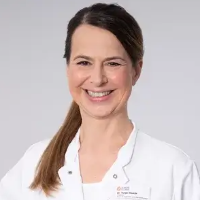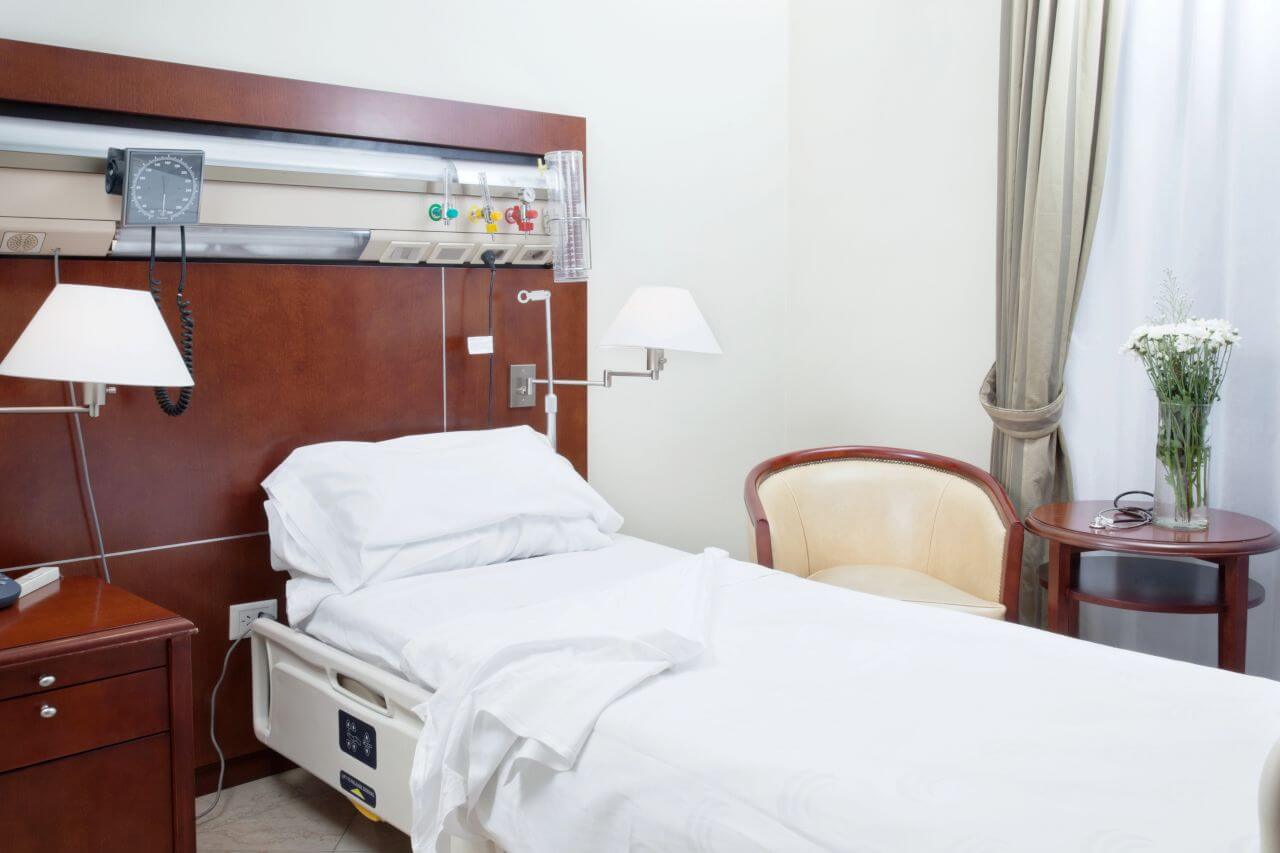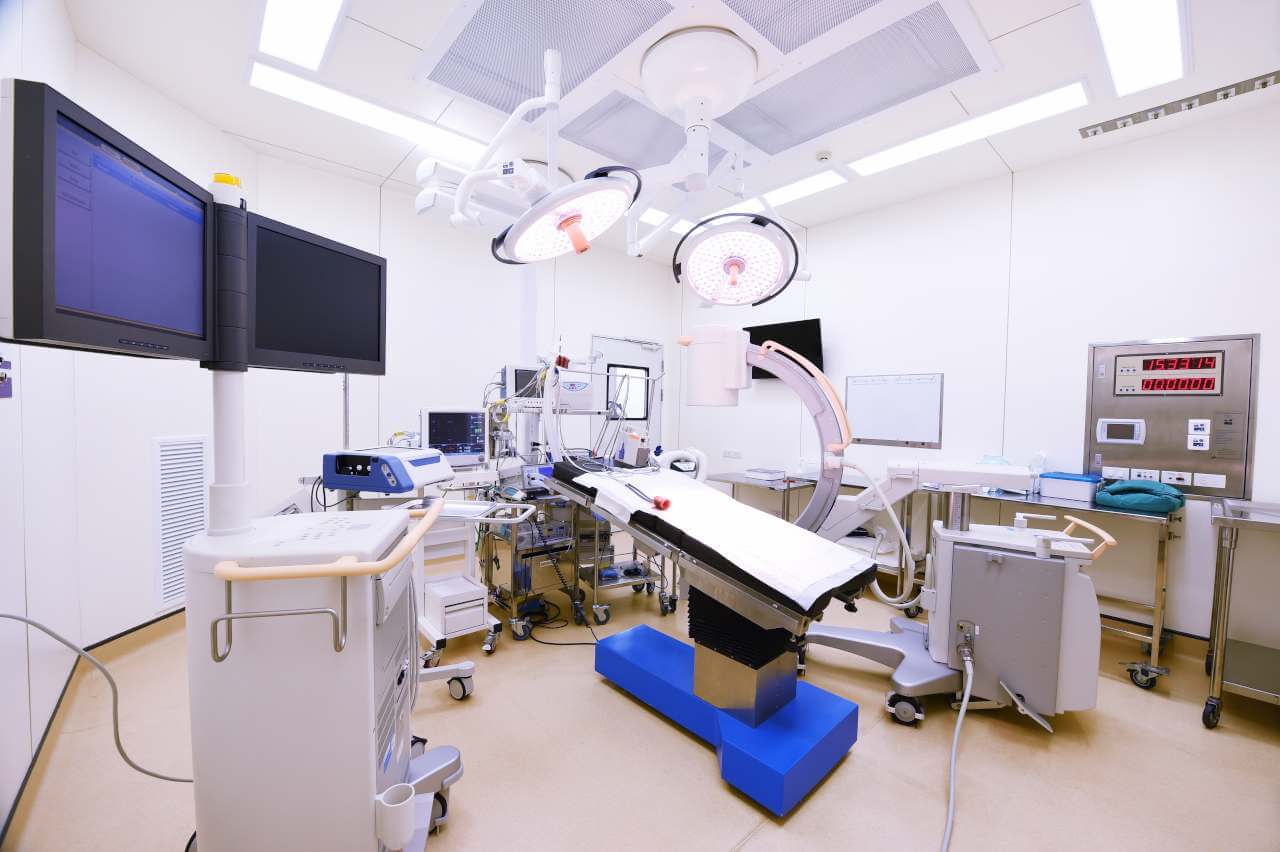
The program includes:
- Initial presentation in the clinic
- clinical history taking
- physical examination
- review of medical records
- laboratory tests:
- complete blood count
- general urine analysis
- biochemical analysis of blood
- indicators of inflammation (CRP, ESR)
- indicators blood coagulation
- x-ray examination
- preoperative care
- titanium osteosynthesis plates placement
- symptomatic treatment
- control examinations
- physiotherapeutic procedures
- orthopedic appliances
- the cost of essential medicines and materials
- nursing services
- full hospital accommodation
- explanation of future recommendations
Required documents
- Medical records
- X-ray examination, MRI/CT scan (if available)
Service
You may also book:
 BookingHealth Price from:
BookingHealth Price from:
About the department
The Department of Trauma Surgery at the Schoen Clinic Duesseldorf offers the full range of medical services in its area of specialization. Patients with traumatic injuries to skeletal bones, joints, tendons, and muscles are treated here around the clock. The department's team of trauma surgeons has extensive experience in the treatment of severe injuries. Of particular interest to doctors at a medical facility is the treatment of pelvic fractures, femoral neck fractures, rib fractures, spinal fractures, cruciate ligament ruptures, and meniscus injuries. The department also offers qualified medical care for occupational and household injuries. The department provides conservative and surgical treatment for musculoskeletal injuries. All diagnostic and therapeutic services comply with current clinical protocols and the requirements of the German Trauma Society (DGU). The department provides both inpatient and outpatient medical care. If necessary, doctors from the Department of Joint Surgery, the Department of Arthroplasty, and the Department of Spinal Surgery may be involved in the therapeutic process. For example, periprosthetic fractures are treated jointly by the department's trauma surgeons and arthroplasty specialists. The department's team of trauma surgeons has all the necessary resources to effectively treat injuries of any severity. The Head Physician of the department is Dr. med. Katja Staade.
The department's specialists have excellent qualifications in the treatment of pelvic fractures, including osteoporotic ones. When a patient is admitted to the department with a suspected pelvic fracture, the specialists urgently conduct a clinical examination and make an X-ray scan. In some cases, a CT scan may also be required. Once the diagnosis is confirmed, trauma surgeons at the medical facility begin to develop an optimal treatment regimen, taking into account the severity of the fracture, the presence or absence of concomitant injuries, and the patient's general condition. For patients with stable pelvic fractures (there is only one non-displaced fracture), the department's doctors recommend conservative treatment such as bed rest, taking painkillers, taking anticoagulants to prevent thrombosis, and a course of physiotherapy. In many cases, patients with stable pelvic fractures need to use a cane, walker, or wheelchair to reduce stress on the lower extremities. For unstable pelvic fractures (two or more displaced fractures), a surgical intervention is performed. During the operation, screw systems and/or plates are most often implanted to fix bone fragments in the correct position.
Of particular clinical interest to the department's team of trauma surgeons is the treatment of spinal fractures. They occur in patients of all age groups: spinal fractures in young patients are often the result of road traffic accidents, and in older people, they develop against the background of osteoporosis. The fractures at this location are diagnosed and treated in collaboration with the specialists from the Department of Spinal Surgery, which is certified in accordance with the standards of the German Spine Society (DWG). During the initial diagnosis, a clinical examination and X-ray scanning of the affected part of the spine are carried out. Next, CT and/or MRI scans are performed to obtain comprehensive diagnostic data and prescribe the most effective treatment regimen. Mild and uncomplicated spinal fractures respond well to conservative therapy, so the department's specialists prescribe symptomatic therapy to relieve pain and provide immobilization of the affected area using orthoses. In cases of unstable spinal fractures, as well as fractures that provoke acute neurological deficits, the department's trauma surgeons urgently (around the clock) perform surgical procedures such as balloon kyphoplasty, screw osteosynthesis, or vertebral body replacement. The department usually performs operations for spinal fractures using minimally invasive techniques.
The therapeutic options at the medical facility are complemented by providing medical care to patients with traumatic meniscus injuries. The department's doctors provide conservative treatment for mild meniscus injuries, which is based on drug therapy and physiotherapy. In cases of severe meniscus tears or injuries due to knee arthrosis, the department's specialists proceed to surgery. The department's trauma surgeons prefer low-traumatic arthroscopic procedures, which require only two miniature skin incisions in the knee joint. Depending on the clinical situation, doctors may perform arthroscopic meniscus suture repair or carry out a cartilage microfracture procedure (this treatment is indicated for patients with meniscus injuries due to knee arthrosis). Following surgery, a team of experienced physiotherapists will take care of the patient.
The department's clinical focuses include the following:
- Conservative and surgical treatment of pelvic fractures
- Conservative and surgical treatment of femoral neck fractures
- Conservative and surgical treatment of spinal fractures
- Conservative and surgical treatment of rib fractures
- Conservative and surgical treatment of cruciate ligament ruptures
- Conservative and surgical treatment of traumatic meniscal injuries
- Conservative and surgical treatment of periprosthetic fractures
- Conservative and surgical treatment of implant-associated infections
- Conservative and surgical treatment of other musculoskeletal injuries and their complications
Curriculum vitae
Higher Education and Professional Career
- Since 2023 Head Physician,Department of Trauma Surgery, Schoen Clinic Duesseldorf.
- 2021 - 2023 Head Physician, Department of General and Abdominal Surgery, Schoen Clinic Duesseldorf.
- 2017 - 2020 Head Physician, Department of General and Abdominal Surgery, Helios Hospital Velbert.
- 2013 - 2016 Head Physician, Department of General and Abdominal Surgery, Trauma Surgery, Dominicus Hospital Duesseldorf.
- 2009 - 2012 Senior Physician, Department of General and Abdominal Surgery, Helios University Hospital Wuppertal.
- 2003 - 2007 Senior Physician, Department of General and Abdominal Surgery, Marien Hospital Wesel.
- 2000 - 2003 Assistant Physician, Department of Surgery, Marien Hospital Herne.
- 1995 - 2000 Internship, Department of General and Abdominal Surgery and Department of Vascular Surgery, Marien Hospital Wesel.
- 1989 - 1995 Medical studies, Ruhr University Bochum.
Prizes, Awards, and Honors
- 2008 Poster Award, 175th Meeting of the Association of Lower Rhine-West Westphalian Surgeons.
- 2001 Poster Award, 168th Meeting of the Association of Lower Rhine-West Westphalian Surgeons.
- 1999 Poster Award, 166th Meeting of the Association of Lower Rhine-West Westphalian Surgeons.
Photo of the doctor: (c) Schön Klinik Düsseldorf
About hospital
According to the reputable Focus magazine, the Schoen Clinic Duesseldorf is one of the top medical facilities in North Rhine-Westphalia and is also one of the best Spinal Surgery Centers in Germany.
The Schoen Clinic Duesseldorf is recognized as a leading medical facility that provides high-quality medical care with an emphasis on a humane attitude and understanding of each patient's individual needs. The clinic offers a range of medical specialties, including orthopedics, trauma surgery, spinal surgery, otolaryngology, cardiology, internal medicine, angiology, and vascular surgery.
Patients' health is in the safe hands of a highly qualified team of more than 590 physicians and nurses. The clinic treats more than 48,000 patients annually, which is a testament to the high level of patient satisfaction with medical services.
The clinic has a comfortable infrastructure, including modern diagnostic rooms, laboratories, an emergency medical care unit, therapeutic rooms, and operating rooms adapted for low-traumatic surgical interventions. It is worth noting that the clinic has a Center for Arthroplasty that is certified according to the EndoCert standards by the German Society for Orthopedics and Orthopedic Surgery (DGOOC). This is the most prestigious certificate in this medical field in Germany.
The Schoen Clinic Duesseldorf provides comprehensive medical care in accordance with international clinical standards, always taking into account the individual needs and wishes of each patient. The doctors strive to provide patients with the most effective and sparing treatment possible using the very latest therapeutic techniques.
Photo: (с) depositphotos
Accommodation in hospital
Patients rooms
Patients of the Schoen Clinic Duesseldorf live in comfortable single and double rooms designed in light colors. The rooms are furnished with a comfortable, automatically adjustable bed with an orthopedic mattress, a wardrobe, a table and chair, a TV set, a telephone, a mini-fridge, and a safe. Each patient room has an ensuite bathroom with a shower and toilet. The bathroom has changeable towels, a hairdryer, toiletries, and a bathrobe.
Meals and Menus
The patient and his accompanying person are offered three meals a day: breakfast, lunch, and dinner. The patient and his accompanying person have a choice of three set menus daily.
If, for some reason, you do not eat all the foods, you will be offered an individual menu. Please inform the medical staff about your dietary preferences prior to treatment.
Further details
Standard rooms include:
![]() Toilet
Toilet
![]() Shower
Shower
![]() Wi-Fi
Wi-Fi
![]() TV
TV
Accompanying person
Your accompanying person may stay with you in your patient room or at the hotel of your choice during the inpatient program.
Hotel
You may stay at the hotel of your choice during the outpatient program. Our managers will support you for selecting the best option.





